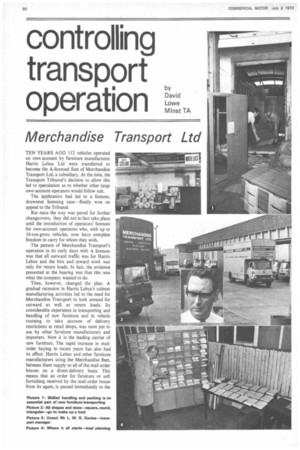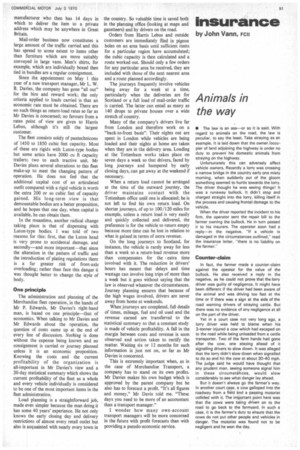controlling transport operation
Page 92

Page 93

If you've noticed an error in this article please click here to report it so we can fix it.
by
David Lowe Mir-1st TA
Merchandise Transport Ltd
TEN YEARS AGO 112 vehicles operated
on own-account by furniture manufacturer Harris Lebus Ltd were transferred to Re become the A-licensed fleet of Merchandise Transport Ltd, a subsidiary. At the time, the Transport Tribunal's decision to allow this led to speculation as to whether other large own-account operators would follow suit.
The application had led to a famous, drawnout licensing case—finally won on appeal to the Tribunal.
But once the way was paved for further changeovers, they did not in fact take place until the introduction of operators' licences for own-account operators who, with up to 16-ton-gross vehicles, now have complete freedom to carry for whom they wish.
The pattern of Merchandise Transport's operation in its early days with A licences was that all outward traffic was for Harris Lebus and the hire and reward work was only for return loads. In fact, the evidence presented at the hearing was that this was what the company wanted to do.
Time, however, changed the plan. A gradual recession in Harris Lebus's cabinet manufacturing activities led to the need for Merchandise Transport to look around for outward as well as return loads. Its considerable experience in transporting and handling of new furniture and in vehicle routeing to take account of delivery restrictions at retail shops, was soon put to use by other furniture manufacturers and importers. Now it is the leading carrier of new furniture. The rapid increase in mailorder buying in recent years has also had its effect. Harris Lebus and other furniture manufacturers using the Merchandise fleet, between them supply to all of the mail-order houses on a direct-delivery basis. This means that an order for furniture or soft furnishing received by the mail-order house from its agent, is passed immediately to the manufacturer who then has 14 days in which to deliver the item to a private address which may be anywhere in Great Britain.
Mail-order business now constitutes a large amount of the traffic carried and this has spread to some extent to items other than furniture which are more suitably conveyed in large vans. Men's shirts, for example, which are individually boxed then tied in bundles are a regular consignment.
Since the appointment on May 1 this year of a new transport manager, Mr L. W.
B. Davies, the company has gone "all out" for the hire and reward work; the only criteria applied to loads carried is that an economic rate must be obtained. There are no such things as return-load rates so far as Mr Davies is concerned; no favours from a rates point of view are given to Harris Lebus, although it's still the largest customer.
The fleet consists solely of pantechnicons of 1450 to 1850 cubic feet capacity. Most of these are rigids with Luton-type bodies but some ernes have 2000 cu ft capacity trailers; two to each tractive unit. Mr Davies plans several alterations to this fleet make-up to meet the changing pattern of operation. He does not feel that the additional capital cost of an articulated outfit compared with a rigid vehicle is worth the extra 200 or so cubic feet of capacity gained. His long-term view is that demountable bodies are a better proposition, and he hopes that one day, when capital is available, he can obtain them.
In the meantime, another radical change taking place is that of dispensing with Luton-type bodies. I was told of two reasons for this: first, that the Luton head is very prone to accidental damage, and secondly—and more important—that since the alteration in the pattern of traffic and the introduction of plating regulations there is a far greater risk of front-axle overloading; rather than face this danger it was thought better to change the style of body.
One principle
The administration and planning of the Merchandise fleet operation, in the hands of Mr P. Edwards. Mr Davies's right-hand man, is based on one principle—that of economics. When talking to Mr Davies and Mr Edwards about the operation. the question of costs came up at the end of every line of discussion. Nothing is done without the expense being known and no consignment is carried or journey planned unless it is an economic proposition. Knowing the costs and the current profitability of the organization is all-important in Mr Davies's view and a 20-day statistical summary which shows the current profitability of the fleet as a whole and every vehicle individually is considered to be one of the most important items in the fleet administration.
Load planning is a straightforward job, made even simpler because the man doing it has some 40 years' experience. He not only knows the early closing day and delivery restrictions of almost every retail outlet but also is acquainted with nearly every town in the country. So valuable time is saved both in the planning office (looking at maps and gazetteers) and by drivers on the road.
Orders from Harris Lebus and outside customers are immediately filed in pigeon holes on an area basis until sufficient items for a particular region have accumulated; the cubic capacity is then calculated and a route worked out. Should only a few orders for any particular area be received, they are included with those of the next nearest area and a route planned accordingly.
The journeys frequently involve vehicles being away for a week at a time, particularly when the deliveries are for Scotland or a full load of mail-order traffic is carried. The latter can entail as many as 140 drops to private houses over a wide stretch of country.
Many of the company's drivers live far from London and therefore work on a "back-to-front basis". Their nights out are spent in London while vehicles are being loaded and their nights at home are taken when they are in the delivery area. Loading at the Tottenham works takes place on seven days a week so that drivers, faced by long journeys and hampered by early closing days, can get away at the weekend if necessary.
When a return load cannot be arranged at the time of the outward journey, the driver maintains contact with the Tottenham office until one is allocated; he is not left to find his own return load. On shorter journeys, of up to 100/120 miles for example, unless a return load is very easily and quickly collected and delivered, the preference is for the vehicle to return empty because more time can be lost in relation to what is gained in terms of extra revenue.
On the long journeys to Scotland, for instance, the vehicle is rarely away for less than a week so a return-load revenue more than compensates for the extra time involved with it. The reduction in drivers' hours has meant that delays and time wastage can involve long trips of more than a week but it goes without saying that the law is observed whatever the circumstances. Journey planning ensures that because of the high wages involved, drivers are never away from home at weekends.
When journeys are completed. full details of times, mileage, fuel and oil used and the revenue earned are transferred to the statistical summary so that a constant study is made of vehicle profitability. A fall in the margin between costs and revenue is soon observed and action taken to rectify the matter. Waiting six or 12 months for such information is just not on, so far as Mr Davies is concerned.
This is extremely important when, as in the case of Merchandise Transport, a company has to stand on its own profits. Mr Davies makes his own budget which is approved by the parent company but he also has to forecast a profit. "It's all figures and money." Mr Davis told me. "These days you need to be more of an accountant than a transport manager."
I wonder how many own account transport managers will be more concerned in the future with profit forecasts than with providing a pseudo-economic service.




































































































































































